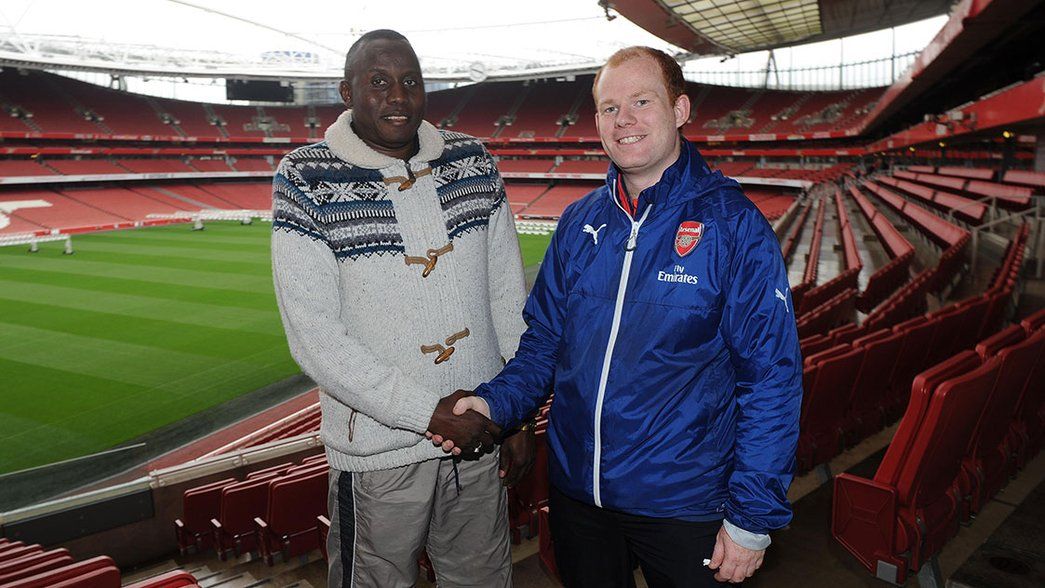Meet the man who has made it his mission to help other people find work, regardless of their age, social standing or personal history.
Jack Ferguson has always wanted to help people. In fact the man who is now responsible for our Employment Programme wanted to help people so much that, having completed a two-week work placement as a secondary school pupil in 2006, he began volunteering for Arsenal in the Community and stayed involved throughout his time at university in London. It seems fitting that someone who now helps others find work started by helping as a volunteer.
Once he’d graduated, Jack took a job on the Employment Programme. “I finished my last exam at university in the morning and by the afternoon I’d been offered a casual contract and encouraged to help develop the programme I’d been volunteering on,” he recalls.
By this time, Arsenal in the Community were finding that the natural end point for many of our sport-based initiatives was to find routes into work for many of the young people who were engaged in estate-based football programmes.
The Employment Programme supported this by linking residents up with the Arsenal FC matchday catering contractor. The attendees went to three employment preparation workshops before joining the contractors and working at the stadium on matchdays. This helped young people into the world of work, but we wanted to take it further, so Jack began to develop the programme and was able to forge a relationship with the local college and jointly deliver job interview skills and wraparound support.
Developing skills
Around the same time, in early 2012, Arsenal in the Community started delivering a Work Skills qualification, which helped participants with the job interview process.
“We realised that many of the young people we were supporting had more barriers to work than just a lack of confidence, so we began to focus on improving maths, English and IT skills,” Jack recalls. “Although we’d seen a reduction in youth unemployment, we’d also seen an increase in unemployment in people over the age of 24, so we were also working with people in their late twenties and developing programmes to support adults aged 50-plus.”
Our Employment Programme staff continued to offer bespoke support in The Arsenal Hub, but were now just as likely to be found working alongside Job Centre Plus colleagues on housing estates in the community. And this approach – engaging people at source for employment support and then bringing them to The Hub for a more relaxed and bespoke support programme – was beginning to pay off.
It was also important for us to recognise that not all people are ready to make the transition into the world of work. Our policy is to always be there to support individuals in their own time. The “door is always open” and it is OK for participants to disengage and return when they’re ready. There can be big gaps in these relationships, and sometimes people don’t return for a year or two.
“It can take as long as two years simply because some people need to make these transitions in their own time,” Jack says. “It might be that they come from a household where there is little pressure to work and it’s not until they see their friends going out or going on holiday when they make the change. It’s at these moments that we’re ready for them.”
Always evolving
While the Employment Programme is organised, structured and successful it is forever evolving to meet the needs of the community and react to new government policies and initiatives. We have increased our focus on school-based programmes, particularly with young people who need careers advice. We developed a Saturday jobs programme aimed at 16 to 18-year-olds who would work for the football club on matchdays. We have also run programmes for people with mental health problems and older people who may not have worked for 30 years.
“We know that for some of these people, including those with dyslexia, that without the right kind of support we can give back at The Hub they would give up pretty quickly,” says Jack. While success in employment programmes is measured in job outcomes, we understand the journeys that many people need to make to secure work.
“We need to tell the story of not just where people finish but also where they start. And even when this journey into work ends successfully, it’s not necessarily where our support for them ends, as they are all people we care about,” Jack adds.
Compared to even one generation ago, young unemployed people have more complex barriers, including heath, disability, housing status or being caught up in the youth justice system. This will often entail a longer journey into full-time work.
In the words of Noel Headon, who was leisure, sports and facilities manager at Islington Council for 16 years until May 2020, “I think the employment strategy that Arsenal have developed has meant a large number of people in the borough who would never have been working in any role legally are now working in full-time employment.
“There are lots of people who have gone through the Elthorne programme, and on other estates as well. Talking mainly about Elthorne, though, there's a number of people who have gone there, engaged and become qualified coaches. A number of people have gone to university or got other qualifications. Without their first engagement with Arsenal, and without Arsenal in the Community wanting to help people, they wouldn’t have achieved that.”
“I thought Arsenal was just a football club” – the photograph above shows Jack Ferguson (right) with Employment Programme participant Borry, whose story you can read here
“We had never seen him so happy” – read John’s case study here
Copyright 2025 The Arsenal Football Club Limited. Permission to use quotations from this article is granted subject to appropriate credit being given to www.arsenal.com as the source.




